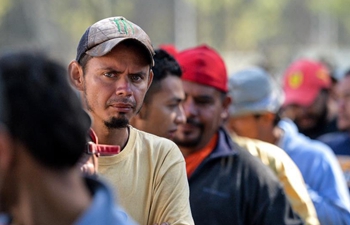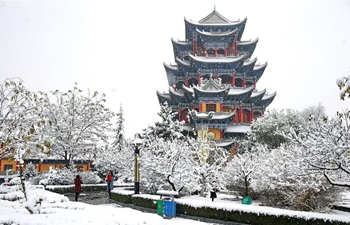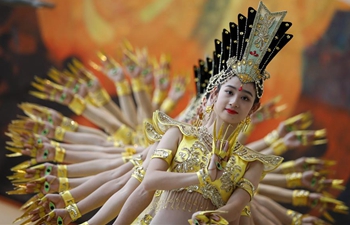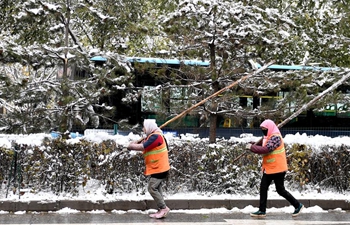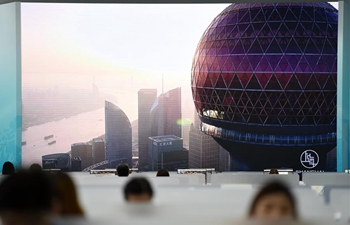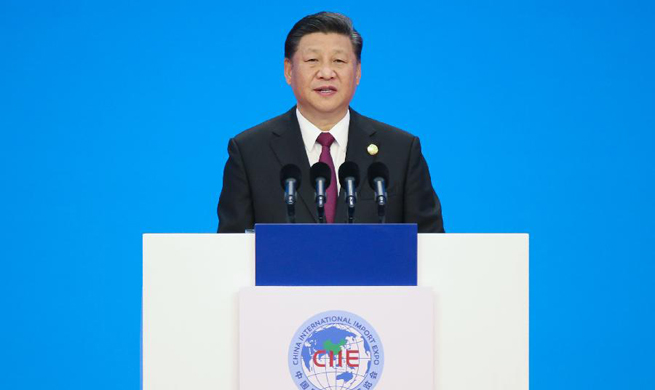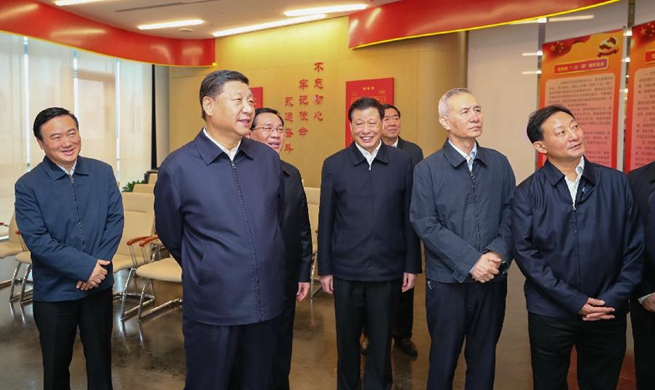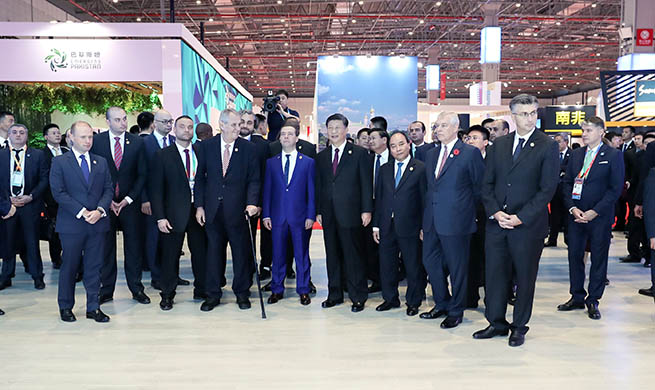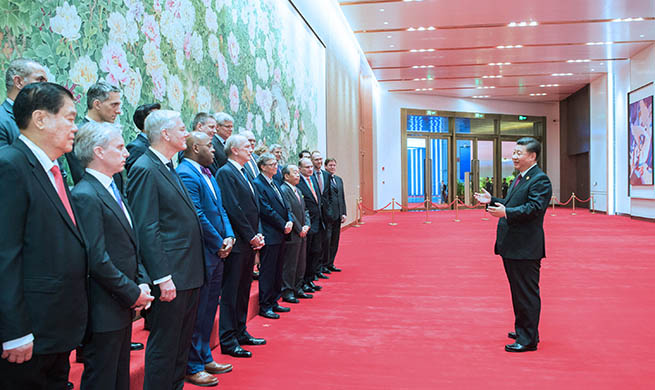by Xinhua writers Yang Shilong, Gao Lu, Chang Yuan
NEW YORK/HOUSTON, Nov. 6 (Xinhua) -- The intense battle between Republican Senator Ted Cruz and Democratic congressman Beto O'Rourke in southern U.S. state of Texas is among the most closely watched races in the country's midterm elections on Tuesday.
Whatever the results turn out to be Tuesday night, the Cruz-O'Rourke contest is a typical case to study on how social media is changing the face of U.S. politics.
FACEBOOK CANDIDATES
"Cruz and O'Rourke had been quite masterful in their use of social media to try to encourage voter's turnout, to try to encourage engagement with voters... especially the O'Rourke people," said Jon R. Taylor, political science professor at University of St. Thomas in Houston, told Xinhua in a recent interview.
O'Rourke's campaign bet heavily on social networks like Facebook, Twitter, YouTube, Snapchat and Instagram specifically to get their message out to targeted voters and donors, which helped elevate the relatively low profile of the 45-year-old congressman as he takes on Cruz who finished second in the 2016 Republican presidential primary.
O'Rourke has spent more on social media advertising than any other candidate in America who faces an election in November, according to a New York University study that tracked Facebook advertising through July 4. His campaign spent 194,400 U.S. dollars to obtain 13 million impressions on Facebook with 377 ads.
His Facebook pipeline to supporters across the country also helped fill O'Rourke's war chest, political strategists said. In the past three months, he brought in more than 38 million U.S. dollars, the most of any Senate candidate in history.
Advertising on social networks is a key to O'Rourke's campaign success, said David Firestein, a public policy expert at the University of Texas in Austin. "That has generated a very large degree of appeal among young voters and other groups of veterans as well," he said.
With bigger platforms provided by social networks including Facebook and Twitter, advocacy groups and politicians alike can easily share campaign news, promote their ideals, and quickly move voters to rally around causes or events, Peter Li, associate professor of East Asia politics, University of Houston-downtown.
"It is a great way to reach out to young people who seldom watch TV. If you want to reach for young voters, reach them through Twitter, through Snapchat, through smartphones and Facebook," said Li, who himself has received more than 20 messages to vote for a certain candidate.
"The strong communication power of social media and their ability to make speedy flow of information left an extensive impact on people in bringing out people to cast ballots and support their favorite parties or candidates," said Jeff Lin, chief of Linking Capital.
Voters are encouraged to share "I voted" or "vote stories" after they cast their ballots on the social net works.
More importantly, social media advertising is far less expensive than television commercials from which the majority of U.S. voters receive their political messaging, Taylor said.
"It is interesting. There is a sounding difference in the way the campaigning is now working in the U.S. You've got the social media campaign where you have very savvy very technically proficient people who are conveying a message," he said. "And you have the traditional media of radio and television. The great differences: television radio cost a lot of money. Twitter's free. It makes a big difference."
According to market research and consumer data source Statista.com, between 2014 and 2018, Facebook featured 295.41 million political ads sponsored by non-profit advocacy organizations, 151.67 million ads from politicians, 128.57 million ads from candidates, 127.93 ads from political organizations or parties, and 101.43 million political ads from individuals.
"I think social media is like a huge game changer everywhere in our society. It's changing the game in the elections. Whereas people had to wait to get their messages out and there was only one outlet. Now there are multiple outlets. You can do it right from your phone. You voice your voice," said Kinberlee Bert, 47, a daycare owner in Chicago.
RISKS OF DISINFORMATION & POLARIZAITON
However, for many, misinformation and disinformation concerning various election campaigns on the social networks are still a serious concern after reports of fake accounts and false news stories infiltrating social networks during the 2016 presidential election.
"There are both positive and negative information on social media sites. Some of them are ill-harbored disinformation aiming to disrupt the midterms. A large amount of false information were circulating or shared on social media," said a senior engineer with an internet company in Silicon Valley, who preferred to be anonymous.
Many social media companies including Facebook and Twitter invested plenty of human resources and technological means to filter and control the flow of such information, the engineer said, adding tools like reporting buttons were open to users to detect suspicious accounts, or analyze whether a particular user has set up different or multiple accounts to spread fake news or false information.
New York resident Alicia, 30, who has a master's degree in environmental studies, said it is necessary for the social networks to prevent the spread of the misinformation.
"If you see it enough, even if you are not sure (it's true or fake), if you see the same thing enough, in enough different places, then it starts to influence your opinion," Alicia said. "For one thing, it affects just what you think is a fact. And for another, it can just mess up what a fact is to you."
"That's why I think we have so many problems now, people think there aren't any real facts anymore, 'I don't even know if it's right or wrong, so I don't care,' and they just ignore everything," she said.
Nathan, 23, a PhD candidate majoring in computer science, who also lives in New York, noted that another downside of the social media is that it makes people "more polarized" on many political and social issues.
"People are more likely to keep using social media if they are interacting with like-minded people. Therefore, social media companies like Facebook, Twitter and YouTube, put similar people together so that they stay on the platforms, thus increasing polarization."
EFFECTS OVERSTATED?
"For me, social media for political purposes is still a very bipartisan and equal opportunity process," noted Sourabh Gupta, senior fellow at the Institute for China-America Studies in Washington, D.C.
Both parties during electoral cycles dating back to the early 2000s have shown that they can be political entrepreneurial in their use of social media - be it in a good way or in a ugly way - and reap the benefits of their smarts, he said.
However, the role of social media in politics has been changed in the United States from being of "a kind of Wild West quality" in previous elections to be under strict purview of federal regulators and social networks themselves, said Ethan Porter, assistant professor of media and public affairs at George Washington University, at a recent briefing hosted by the Foreign Press Center.
"It's now much more difficult for a political campaign to actually issue its advertisements and distribute its messages over social media," he said.
There are "really aggressive regulations" that, in Facebook's case, Facebook has put on itself to control the flow of political information on Facebook, he said. "You need to go through a verification process to verify that you are in fact a political campaign, and you then need to show that your messages accord with federal election law and also accord with Facebook's own terms of service."
"It's easy to overstate the role of social media in American elections. It's easy to think that because of a few bad actors, a few bad apples, social media is simply causing people to vote a certain way or hold certain beliefs," Porter said.
"That's largely actually not the case. Media effects are small. And by media effects I mean the effect that any one media message or media story is going to have on people's political beliefs or political behaviors," he said. "I think this is often disappointing for the media to hear, but media effects were small before social media and they have continued to be small in the age of social media."
(Xinhua correspondents Wu Xiaoling and Ye Zaiqi in San Francisco, Miao Zhuang in Chicago and Huang Heng in Los Angeles contributed to the story.)
